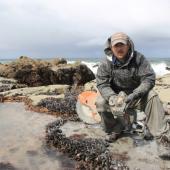In 2011, Smithsonian paleontologists heard rumors of a large number of marine fossils while working in the Atacama Region of Chile. This site, Cerro Ballena, or “whale hill” in Spanish, contained the skeletons of more than 40 whales and other marine mammals.

Title
- Curator of Fossil Marine Mammals, National Museum of Natural History
Recent Publications
- The dilemma of trade samples and the importance of museum vouchers—caveats from a study on the extinction of Steller's sea cow: a comment on Cre (2016)
- Arktocara yakataga, a new fossil odontocete (Mammalia, Cetacea) from the Oligocene of Alaska and the antiquity of Platanistoidea (2016)
- The rise of ocean giants: maximum body size in Cenozoic marine mammals as an indicator for productivity in the Pacific and Atlantic Oceans (2016)
- Formation of the Isthmus of Panama (2016)
- Oroclinal bending of the Juan Fernández Ridge suggested by geohistory analysis of the Bahía Inglesa Formation, north-central Chile (2016)
Locations
- Chile
Nick Pyenson is a vertebrate paleontologist who studies how marine life changes over incredibly long periods of time.
In the span of geologic time, many different lineages of families of reptiles and mammals independently entered the oceans, showing both common patterns and unique solutions to the challenges of living in the water. The knowledge that paleontology provides us about the natural world can help us understand the magnitude of changes to biodiversity as a result of climate changes over time.
In 2011, Nick worked with Smithsonian’s 3D digitization team to record a unique paleontological site in Chile. These images, models, and scientific findings are now available online to anyone.
Nick has participated in fieldwork all around the world to understand how and why these ecological transitions happened. He received his Ph.D. from the University of California, Berkeley.